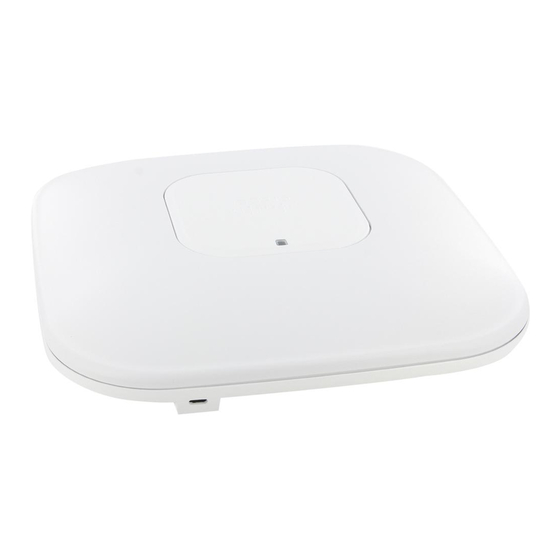Cisco WS-C3550-12G Datasheet - Page 5
Browse online or download pdf Datasheet for Wireless Access Point Cisco WS-C3550-12G. Cisco WS-C3550-12G 19 pages. 3500 series lightweight access point
Also for Cisco WS-C3550-12G: Getting Started Manual (35 pages)

VLANs ensure that data packets are forwarded only to stations within a specific subnet, creating a separate collision domain between groups of ports
on the network and reducing broadcast transmission. VLAN trunks can be created from any port using the standards-based 802.1Q or Cisco Inter-
Switch Link (ISL) VLAN trunking architecture. The Cisco Catalyst 3550 switches support up to 1,005 VLANs.
For even greater security between network end-stations, Private VLAN Edge isolates ports on a switch, ensuring that users cannot snoop on other
users' traffic. Local Proxy Address Resolution Protocol (ARP) works in conjunction with private VLAN edge to minimize broadcasts and maximize
available bandwidth.
NETWORK MANAGEMENT WITH THE CISCO CLUSTER MANAGEMENT SUITE SOFTWARE
The Cisco CMS is Web-based software that is embedded in Catalyst 3550, 2950, 3500 XL, 2900 XL, 2900 LRE XL, and 1900 switches.
Through Cisco Switch Clustering technology, users access Cisco CMS with any standard Web browser to manage up to 16 of these switches at
once, regardless of their physical proximity—with the option of using a single IP address for the entire cluster if desired. With the addition of the
Catalyst 3550 switches, Cisco CMS Software can now extend beyond routed boundaries for even more flexibility in managing a Cisco cluster.
Cisco CMS provides an integrated management interface for delivering intelligent services, such as multilayer switching, QoS, multicast, and
security ACLs. Thus, Cisco CMS allows administrators to take advantage of benefits formerly reserved for only the most advanced networks
without having to learn the command-line interface (CLI) or even the details of the technology.
The new Guide Mode in Cisco CMS leads the user step-by-step through the configuration of high-end features and provides enhanced online
help for context-sensitive assistance. In addition, Cisco AVVID (Architecture for Voice, Video and Integrated Data) Wizards provide automated
configuration of the switch to optimally support video streaming or videoconferencing, voice over IP (VoIP), and mission-critical applications.
Additional wizards for LAN security and multicast traffic are available too. These Wizards can save hours of time for network administrators,
eliminate human errors, and ensure the configuration of the switch is optimized for these applications.
Because Cisco Switch Clustering technology is not limited to a single stack of switches, Cisco CMS expands the traditional cluster domain beyond
a single wiring closet and saves time and effort for network administrators. The switches must merely be connected to each other via Ethernet, Fast
®
Ethernet, Fast EtherChannel
, Gigabit Ethernet, Gigabit EtherChannel, and/or GigaStack connectivity.
Cisco Catalyst 3550 switches can be configured either as command or member switches in a Cisco switch cluster. Cisco CMS also allows the
network administrator to designate a standby or redundant command switch, which takes the commander duties should the primary command switch
fail. Other key features include the ability to configure multiple ports and switches simultaneously, perform software updates across the entire cluster
at once, and clone configurations to other clustered switches for rapid network deployments. Bandwidth graphs and link reports provide useful
diagnostic information and the topology map gives network administrators a quick view of the network status.
In addition to Cisco CMS, the Catalyst 3550 products are manageable via CiscoWorks products, which provide full enterprise-class network
management. CiscoWorks Resource Manager Essentials (RME) can be used to perform network-wide software upgrades, configuration file audits,
configuration file distribution, and inventory reports. Additional tools include the Campus Manager, CiscoView, Device Fault Manager (DFM), QoS
Policy Manager (QPM), User Registration Tool, and many others. For smaller networks, CiscoWorks Small Network Management Solution (SNMS)
provides advanced network management capabilities to reduce IT administrative overhead.
© 2005 Cisco Systems, Inc. All rights reserved.
Important notices, privacy statements, and trademarks of Cisco Systems, Inc. can be found on cisco.com.
Page 5 of 18
